SSDI Lawsuits and Mental Health Disabilities: What to Know
- Last Updated: June 12th, 2025

Attorney Jessica Paluch-Hoerman, founder of TruLaw, has over 28 years of experience as a personal injury and mass tort attorney, and previously worked as an international tax attorney at Deloitte. Jessie collaborates with attorneys nationwide — enabling her to share reliable, up-to-date legal information with our readers.
Legally Reviewed
This article has been written and reviewed for legal accuracy and clarity by the team of writers and legal experts at TruLaw and is as accurate as possible. This content should not be taken as legal advice from an attorney. If you would like to learn more about our owner and experienced injury lawyer, Jessie Paluch, you can do so here.
Fact-Checked
TruLaw does everything possible to make sure the information in this article is up to date and accurate. If you need specific legal advice about your case, contact us by using the chat on the bottom of this page. This article should not be taken as advice from an attorney.
Key takeaways:
- The Social Security Disability Insurance (SSDI) program supports people with mental health disabilities.
- Medical documents and Consultative Examinations are key in the SSDI claims process.
- Lawsuits can arise from fraud allegations within SSA's decision - making for disability benefits.
Overview of SSDI Lawsuits and Mental Health Disabilities
On this page, we’ll discuss how SSDI Lawsuits work for individuals with mental health disabilities, what steps to take when filing an SSDI Lawsuit, who qualifies for an SSDI Lawsuit, and much more.
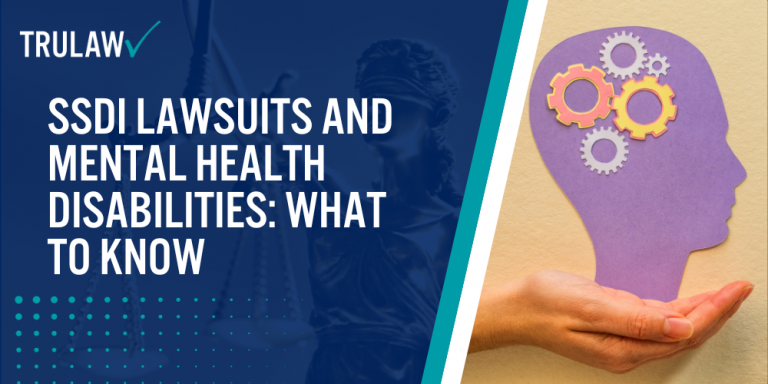
Intro to SSDI Lawsuits for Claimants with Mental Health Disabilities
Are you living with a mental health disability and confused about Social Security Disability Insurance (SSDI) Lawsuits?
Navigating these legal waters can be complex, especially considering that people often mix up SSDI with Supplemental Security Income (SSI).
This blog post is here to clear the fog and empower you with vital knowledge about SSDI lawsuits related to mental health disabilities.
Stay tuned, because every sentence could bring you one step closer to understanding your rights!
Table of Contents
Social Security and Mental Health Disabilities
The Social Security Disability Insurance (SSDI) program provides support for people with various types of mental health disabilities, ensuring they receive the necessary financial assistance.
Social Security Disability Insurance (SSDI)
Social Security Disability Insurance (SSDI) operates as a crucial social insurance program.
It provides benefits to eligible workers who have become disabled and are unable to continue working due to severe medical conditions that persist for at least a year or are fatal.
These SSDI benefits also extend to dependents, such as children, spouses, and even widows or widowers in some cases.
SSDI is funded by payroll taxes, which means you earn the ability to access these benefits through your employment history.
The coverage includes an array of mental disorders classified under 12 categories aligning with the diagnosis criteria set by the Social Security Administration(SSA).
SSDI Lawsuits: Types of Mental Health Disabilities Covered by SSDI
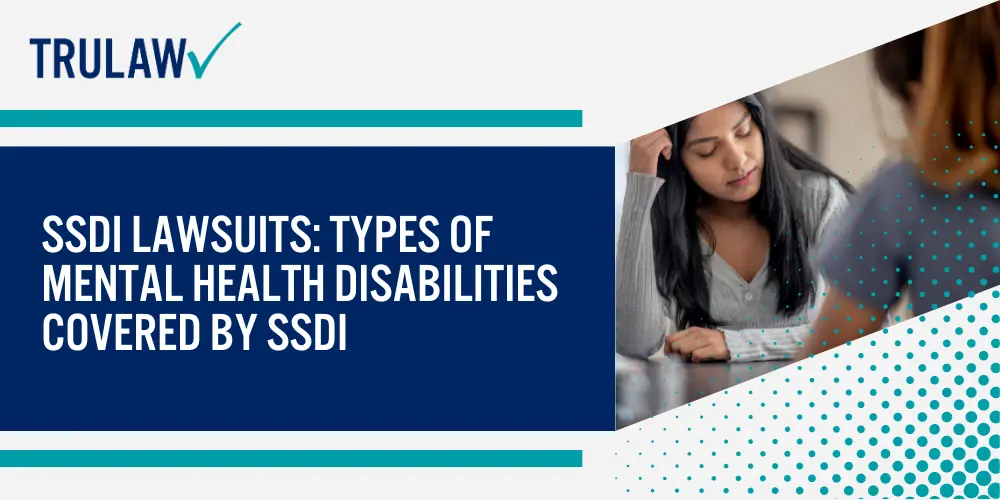
The SSDI or Social Security Disability Insurance program offers benefits for a range of mental health disabilities.
This includes, but is not limited to:
- Schizophrenia: A chronic and severe mental disorder that affects the way a person thinks, feels, and behaves.
- Bipolar disorder: A mental illness marked by extreme shifts in mood that include emotional highs (mania or hypomania) and lows (depression).
- Clinical depression: A mental health disorder characterized by persistently depressed mood or loss of interest in activities, causing significant impairment in daily life.
- Anxiety disorders: A group of mental disabilities characterized by feelings of anxiety and fear.
- Autism spectrum disorder: Conditions related to brain development that impact a person’s social interaction and communication skills.
- Post-traumatic stress disorder (PTSD): A psychiatric disorder that may occur in people who have experienced or witnessed a traumatic event.
- Attention Deficit Hyperactivity Disorder (ADHD): A neurological disorder affecting both children and adults, resulting in difficulty with attention regulation, hyperactivity, and impulsiveness.
How Does the Social Security Administration Process Disability Claims?
The Social Security Administration conducts a thorough review of medical records and may request additional examinations or consultative exams to determine the validity and severity of a social disability claim.
The Medical Record Process for Claims
- The process of compiling medical records for disability claims involves a series of crucial steps:
- Completing the initial application: The claimant describes their impairments and provides relevant treatment sources.
- Gathering evidence from medical sources: This primarily includes healthcare providers who have examined or treated the claimant. The Social Security Administration (SSA) relies heavily on this evidence to evaluate the claim.
- Providing objective medical evidence: SSA regulations necessitate that claims are backed by “objective medical evidence” from an “acceptable medical source.” This helps establish a medically determinable impairment.
- Involving Disability Determination Services (DDS): SSA contracts with DDS in every state for determining medical eligibility for disability claims.
- Complying with the “All” Evidence Rule: Under this rule, claimants no longer need to submit unfavorable evidence in their Social Security disability cases.
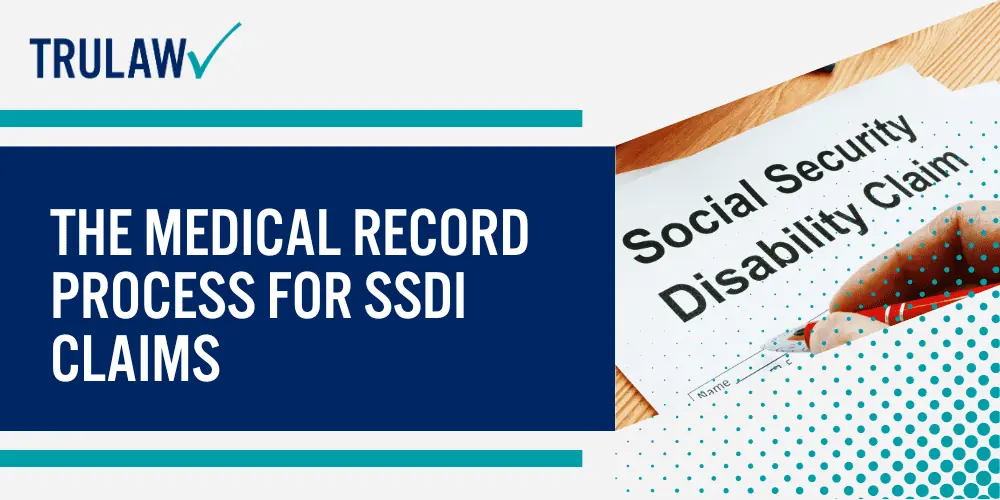
The Consultative Exam Process
The consultative exam process plays a vital role in verifying the validity of disability claims for SSDI or SSI.
Here’s how it works:
- It starts with obtaining Consultative Examinations (CEs), primarily when additional information is needed for disability determination.
- Health professionals like physicians, osteopaths, psychologists conduct these examinations.
- These examinations also assist in resolving conflicting information present in a claimant’s file.
- The CE report incorporates minimum content guidelines essential for adult claimants with special senses and speech disorders.
- During this examination process, extensive medical records are reviewed to confirm the severity of disabilities.
- The consultation aims to gather enough evidence to validate most Social Security disability claims that go through the initial processing network.
- Mental disorders, significant for SSDI or SSI claims, fall into one of 11 categories as per the Social Security Administration standards.
Lawsuits Alleging Fraud in the Decision-Making Process
Uncovering the truth about SSDI lawsuits that accuse the Social Security Administration of fraudulent practices in their disability claims decision-making process.
Recent Class-Action Lawsuits Against the SSA
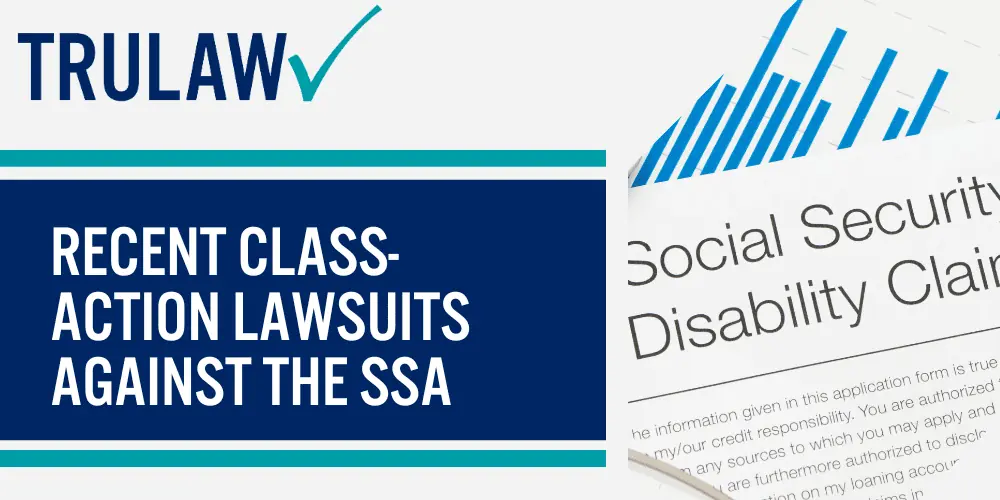
Highlighting the recent judicial trends, several class-action lawsuits have been filed against the Social Security Administration (SSA).
These lawsuits predominantly center on alleged fraud in the decision-making process for Social Security Disability Insurance (SSDI) benefits and mental health disabilities.
Let’s go over into a few:
- The case of “Padro et al. v. Colvin” presents a noteworthy instance of such lawsuits. This specific class-action settlement underscores serious concerns about the impartiality and fairness in the method utilized by SSA to determine disability benefits.
- A fraud scheme involving SSDI benefits was uncovered in New York leading to another significant lawsuit against SSDI. The extent of this fraud underscores an essential need for thorough oversight and vigilance in benefit determination procedures.
- More recently, some applicants have challenged SSA’s ‘“All” evidence rule‘ that eliminates the requirement to submit unfavorable evidence in Social Security disability cases through lawsuits.
- In response to allegations of inappropriate conduct by administrators, another class – action lawsuit emerged focusing on misconduct by administrative law judge during SSDI hearings.
- The implementation of a new electronic disability system by SSA has also sparked legal disputes with several claimants seeing this as an infringement upon their rights and opposing it through class-action lawsuits.
What is ERISA?
ERISA, the Employee Retirement Income Security Act, establishes standards to protect employees in health and pension plans.
It can have significant implications for your SSDI claim.
How it Affects Social Security Disability Claims
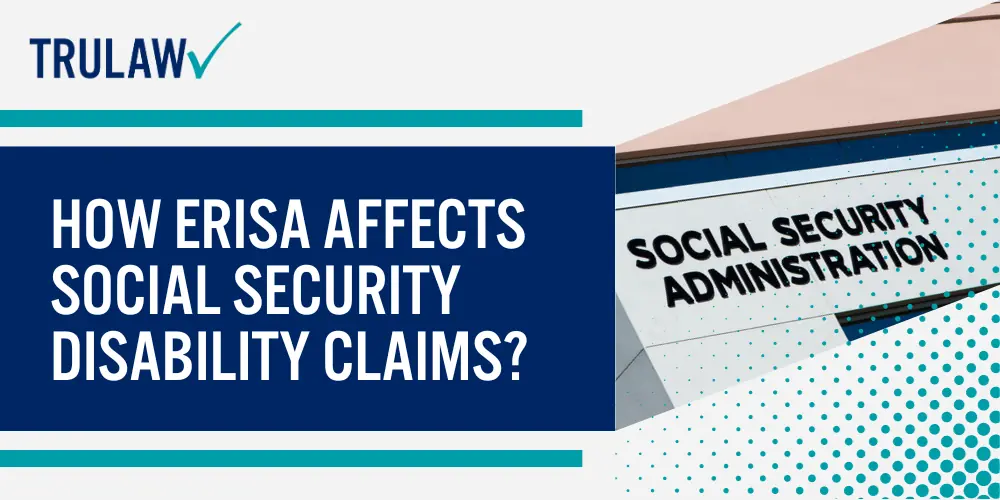
The impact of ERISA on Social Security Disability Insurance (SSDI) claims is far reaching.
As a federal regulation, ERISA governs long-term disability benefits offered through employer-sponsored plans.
Specifically, it allows the plan administrator to make determinations regarding disability based on the unique language present in each insurance policy.
These regulations exist independently of SSDI programs but can often intersect with them, particularly when an individual becomes unable to continue their employment due to a disabling condition.
Over time, changes have been introduced to enhance protections for claimants throughout the process of filing disability benefit claims under ERISA’s rules and guidelines.
This critical connection between ERISA and SSDI necessitates that applicants comprehend how both systems affect their eligibility status and potential benefit amount while navigating these complex procedures.
Why You Need an Experienced SSDI Attorney
An experienced SSDI attorney can guide you through the complex process of pursuing a disability claim, effectively addressing potential hurdles and increasing your chances of securing benefits.
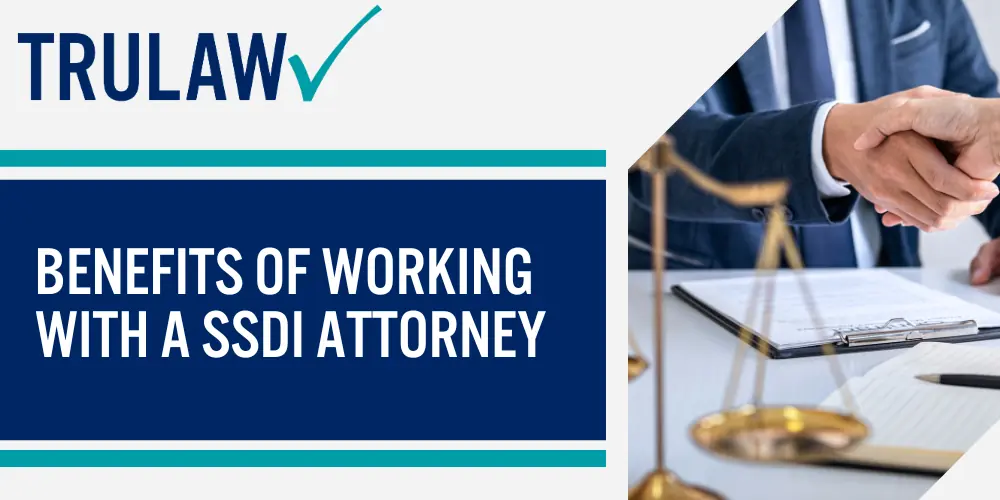
Benefits of Working with an SSDI Attorney
Navigating the SSDI laws and regulations can be a daunting task, but enlisting the help of an experienced SSDI attorney can simplify this process.
Key benefits of working with an SSDI attorney include:
- Your attorney will expedite the process to obtain SSDI benefits, giving you peace of mind.
- Involving an attorney early in your SSDI application process ensures your case gets off to the best possible start.
- Skilled disability lawyers possess effective strategies and knowledge to enhance your odds of winning SSDI or SSI benefits.
- The benefit amount for SSDI is based on past earnings – understanding this could prove complex, but with professional assistance, you’ll get it right.
Steps to Take Before Filing a Lawsuit Against the SSA
Before initiating a lawsuit against the Social Security Administration (SSA), it’s essential to understand the necessary steps involved, such as gaining an understanding of your rights, confirming the validity of your claim, seeking legal counsel, and preparing for potential outcomes.
Considerations Before Filing a Lawsuit
Making the decision to file an SSDI lawsuit requires careful thought and planning.
Here are a few things you need to consider:
- Understand your rights: Familiarize yourself with the rights and responsibilities linked to SSDI benefits, including eligibility criteria.
- Gather necessary documentation: Organize all relevant medical records proving your disability, as objective medical evidence is required for SSDI claims.
- Know the appeal stages: There are four levels of appeal available if your application is denied initially by SSA.
- Evaluate potential outcomes: Getting approved for SSDI benefits takes time, so be prepared for delays and possible denial in initial claims.
- Be ready for court proceedings: Legal proceedings can be extensive and stressful, it’s crucial to mentally prepare for this process.
- Consider legal representation: Hiring an attorney experienced in SSDI lawsuits can provide invaluable advice during this process.
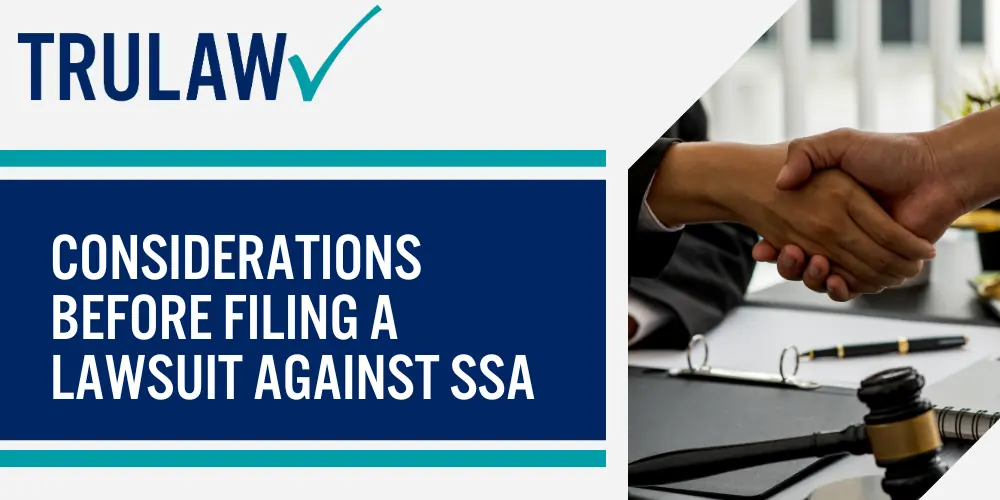
Contacting an Attorney for a Free Consultation
Obtaining legal advice prior to taking action against the Social Security Administration can be a crucial step.
Many attorneys offer free initial consultations for individuals seeking to file SSDI lawsuits, especially related to mental health disabilities.
These professionals guide you through the complexities of social security law and help in preparing an effective case.
In this meeting, they assess your situation and advise on the potential strength of your claim.
Asserting your rights with legal backing maximizes chances for a favorable outcome while minimizing unnecessary stress in navigating the system alone.
A commitment-free consultation is a valuable resource that should not be overlooked when dealing with SSDI issues.
Key SSI/SSDI Cases
We will explore into the critical SSI/SSDI cases, including Adams v. Bowen, Evangelista v. Sec’y HHS, Barnhart v. Walton, and Mills v. Apfel to reveal their implications on current SSDI lawsuits.
Adams v. Bowen
The pivotal court case of Adams v. Bowen took place on April 19, 1989.
The plaintiff, named Adams, argued that he was functionally blind and sought disability benefits.
This brought attention to the ‘All’ Evidence Rule by the Social Security Administration (SSA), which is often a critical factor in disability cases.
While not every case seeking Social Security disability benefits hinges on functional blindness as Adams did, this impactful ruling serves as a reference point for many future SSDI or Social Security Disability Insurance lawsuits.
It remains listed among important federal court decisions published from 1960 to 2005 regarding Social Security Rulings.
Evangelista v. Sec’y HHS
In the Evangelista v. Sec’y HHS case, a significant precedent was established in how courts handle appeals for Social Security disability benefits related to mental health disabilities.
The lawsuit revolved around what constitutes acceptable evidence during SSI and SSDI cases.
The First Circuit Court took into consideration the types of evidence evaluated by federal courts when determining an appeal’s outcome.
This landmark decision echoed across courthouses nationwide as they adapted their processes to align with this ruling.
Furthermore, it gave clear directions on how Appeals Council decisions are reviewed, thus shaping the standard approach for subsequent court evaluations of such decisions in SSDI lawsuits concerning mental health disabilities.
With its influence still felt today, Evangelista v. Sec’y HHS remains a noteworthy facet in understanding SSDI lawsuits related to mental health disputes.
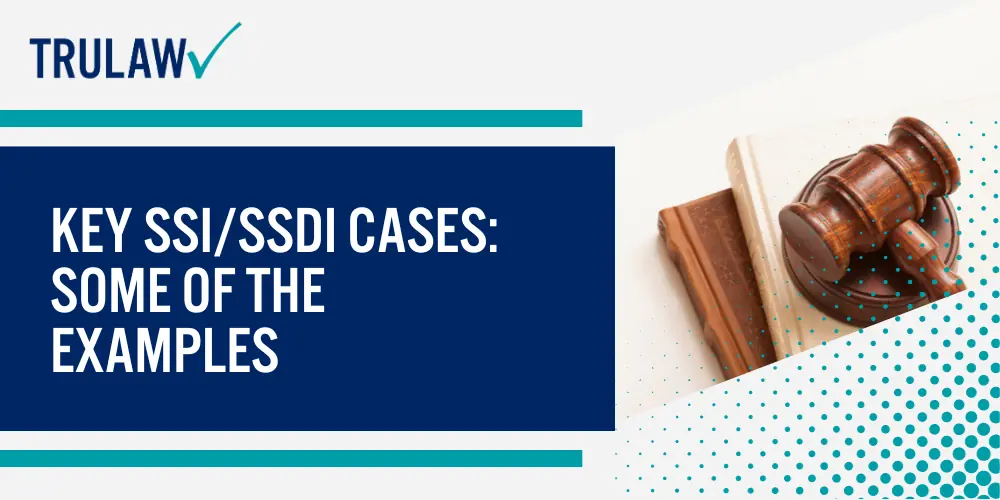
Barnhart v. Walton
Cleveland Walton lodged a claim for disability insurance benefits and Supplemental Security Income (SSI) under Titles II and XVI of the Social Security Act.
This case, known as Barnhart v.
Walton reached the United States Supreme Court on March 27, 2002.
It’s a significant example of several cases involving disabled individuals that impacted initial SSDI benefit decisions profoundly.
At the time this case was handled, it took an average of 104 days to render an initial decision on SSDI benefits.
The proceedings transpired in front of the United States Court of Appeals for the Fourth Circuit before reaching the Supreme Court level.
Mills v. Apfel
Mills v. Apfel set a landmark ruling in 2001 regarding the inclusion of vocational experts during Social Security hearings.
The First Circuit court ruled that the Social Security Administration (SSA) needed to show a “rational decision” when it comes to vocational affairs prior to deploying such experts in any hearing.
This legal requirement emphasizes fair and justified decisions based on objective evaluations, ensuring every claimant gets evaluated under the same standards during their disability benefits application process.
This case continues to influence how SSA hearings are conducted, particularly concerning mental health disabilities, and highlighting the essentiality of transparency and rationality within these proceedings.
The Role of Employers in SSDI Lawsuits and Understanding ERISA
Employers hold a prominent position in SSDI lawsuits through their administration of employee benefit plans and processing disability claims.
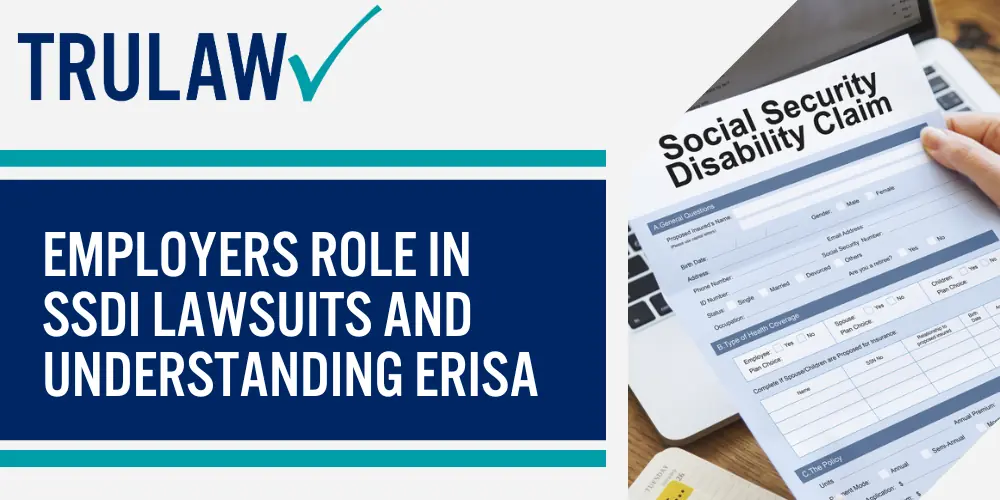
Their duty includes ensuring that their employees understand the provisions of ERISA, which stands as the chief regulation overseeing employer-backed benefits including long-term disability advantages.
This law empowers the insurance plan administrator to assess whether a claimant is disabled based on directives given by the insurance policy.
In addition to administering private long-term disability policies, employers might also handle Workers’ Compensation claims.
Unlike SSDI, Workers’ Compensation offers benefits for work-related conditions and partially substitutes lost income.
Some individuals may even receive both long-term disability benefits and workers’ compensation simultaneously depending on their circumstances.
Understanding these complexities underscores why employers play an integral role in navigating SSDI lawsuits and comprehending ERISA’s implications.
Conclusion: Contact Trulaw for a Free Consultation.
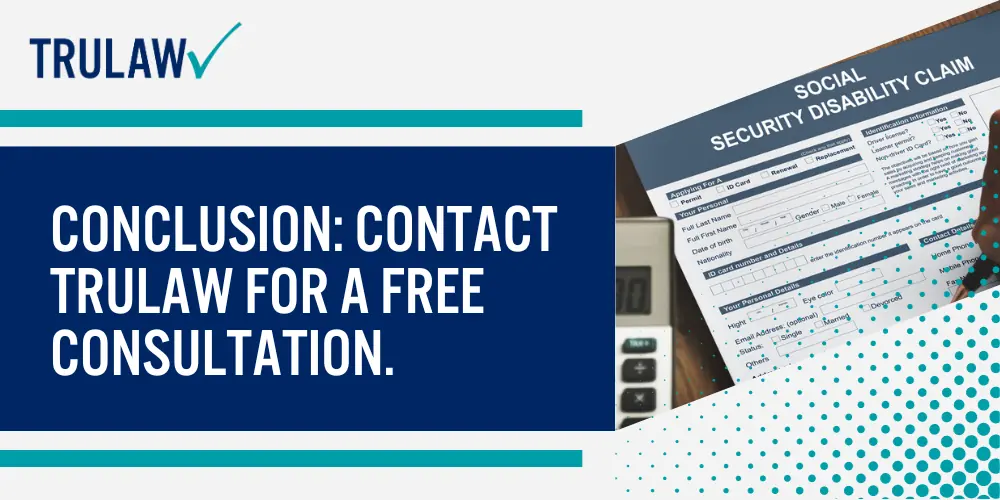
In the journey of pursuing SSDI benefits, you’re not alone.
Let Trulaw be your guiding light amidst this legal maze.
Our expertise in handling SSDI cases assures that we put up a formidable fight for your rights.
Don’t delay. Reach out to us now and start your consultation absolutely free!
Social Security Disability Insurance Frequently Asked Questions
-
What Is Substantial Gainful Activity In Relation To SSDI Lawsuits?
Substantial gainful activity refers to the level of work that a person can do despite their mental impairments, as recognized by Social Security Administration SSA.
-
How Does A Medical Professional Influence Disability Decisions?
A doctor or other acceptable medical sources provide substantial evidence about your health limitations.
This information guides the hearing office in making disability decisions.
-
What Happens At A District Court For An SSDI Lawsuit?
The district court reviews all documents and evidence from both sides, including agency’s regulations (federal agency), before making any determinations on class action lawsuits involving SSDI claims.
-
Why Might There Be A Waiting Period When Filing For Social Security Disability Insurance (SSDI)?
Processing times could vary due to various reasons such as verifying medical conditions with your doctor, the number of cases being reviewed during fiscal years and ensuring all court documents are correctly filed.
-
Can Pain Or Death Affect My Chances With An SSDI Lawsuit?
Yes!
The severity of your condition contributes significantly to case outcomes based on evidence given by the commissioner or documented limitations provided by your doctor.

Managing Attorney & Owner
With over 25 years of legal experience, Jessica Paluch-Hoerman is an Illinois lawyer, a CPA, and a mother of three. She spent the first decade of her career working as an international tax attorney at Deloitte.
In 2009, Jessie co-founded her own law firm with her husband – which has scaled to over 30 employees since its conception.
In 2016, Jessie founded TruLaw, which allows her to collaborate with attorneys and legal experts across the United States on a daily basis. This hypervaluable network of experts is what enables her to share the most reliable, accurate, and up-to-date legal information with our readers!
Additional Social Security Disability Insurance resources on our website:
Here, at TruLaw, we’re committed to helping victims get the justice they deserve.
Alongside our partner law firms, we have successfully collected over $3 Billion in verdicts and settlements on behalf of injured individuals.
Would you like our help?
At TruLaw, we fiercely combat corporations that endanger individuals’ well-being. If you’ve suffered injuries and believe these well-funded entities should be held accountable, we’re here for you.
With TruLaw, you gain access to successful and seasoned lawyers who maximize your chances of success. Our lawyers invest in you—they do not receive a dime until your lawsuit reaches a successful resolution!
AFFF Lawsuit claims are being filed against manufacturers of aqueous film-forming foam (AFFF), commonly used in firefighting.
Claims allege that companies such as 3M, DuPont, and Tyco Fire Products failed to adequately warn users about the potential dangers of AFFF exposure — including increased risks of various cancers and diseases.
Depo Provera Lawsuit claims are being filed by individuals who allege they developed meningioma (a type of brain tumor) after receiving Depo-Provera birth control injections.
A 2024 study found that women using Depo-Provera for at least 1 year are five times more likely to develop meningioma brain tumors compared to those not using the drug.
Suboxone Tooth Decay Lawsuit claims are being filed against Indivior, the manufacturer of Suboxone, a medication used to treat opioid addiction.
Claims allege that Indivior failed to adequately warn users about the potential dangers of severe tooth decay and dental injuries associated with Suboxone’s sublingual film version.
Social Media Harm Lawsuits are being filed against social media companies for allegedly causing mental health issues in children and teens.
Claims allege that companies like Meta, Google, ByteDance, and Snap designed addictive platforms that led to anxiety, depression, and other mental health issues without adequately warning users or parents.
Transvaginal Mesh Lawsuits are being filed against manufacturers of transvaginal mesh products used to treat pelvic organ prolapse (POP) and stress urinary incontinence (SUI).
Claims allege that companies like Ethicon, C.R. Bard, and Boston Scientific failed to adequately warn about potential dangers — including erosion, pain, and infection.
Bair Hugger Warming Blanket Lawsuits involve claims against 3M — alleging their surgical warming blankets caused severe infections and complications (particularly in hip and knee replacement surgeries).
Plaintiffs claim 3M failed to warn about potential risks — despite knowing about increased risk of deep joint infections since 2011.
Baby Formula NEC Lawsuit claims are being filed against manufacturers of cow’s milk-based baby formula products.
Claims allege that companies like Abbott Laboratories (Similac) and Mead Johnson & Company (Enfamil) failed to warn about the increased risk of necrotizing enterocolitis (NEC) in premature infants.
Here, at TruLaw, we’re committed to helping victims get the justice they deserve.
Alongside our partner law firms, we have successfully collected over $3 Billion in verdicts and settlements on behalf of injured individuals.
Would you like our help?

